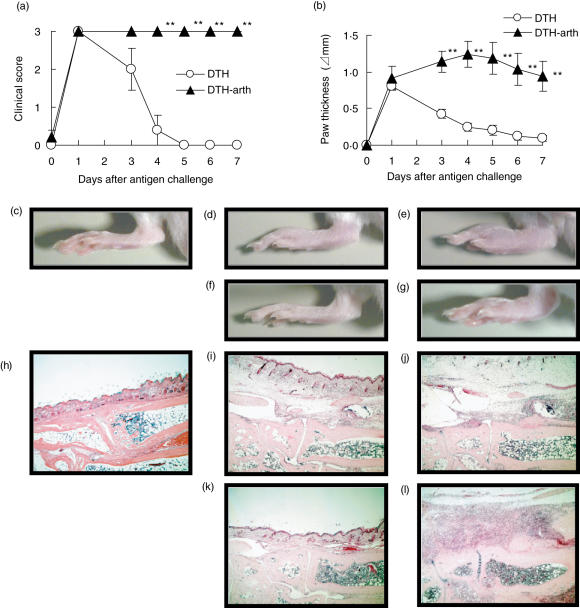Fig. 1.
Administration of anti-CII monoclonal antibody (MoAb) sustains footpad swelling of mice caused by a delayed-type hypersensitivity (DTH) reaction and induces severe arthritis. Clinical score (a) and paw thickness (b) of mice induced with DTH or DTH arthritis. The mice were immunized intradermally with methylated bovine serum albumin (mBSA) (0·25 mg/body). Four days after immunization, the mice were injected intravenously with anti-CII MoAb (0·5 mg/0·5 ml/body) for DTH arthritis induction. Seven days after the immunization, DTH (○) or DTH arthritis (DTH-arth) (▴) was elicited in the mice by challenging mBSA into their right footpads (0·05 mg/0·05 ml/footpad). As a control, their left footpads were challenged by saline. As described in Materials and methods, the severity is represented by the clinical score and paw thickness. The data were expressed as the mean ± s. e.m. of the five mice in each group. The clinical score and paw thickness of the DTH arthritis-induced mice was significantly different from those of the DTH-induced mice (**P < 0·01). Representative photographs of the footpad (c–g) and the histological sections of the tarsal joints stained with haematoxylin and eosin (h–l) in mice are shown. Normal mice (c and h), the DTH-elicited mice 1 day (d and i) or 7 days (f and k) after the mBSA challenge, the DTH arthritis-elicited mice 1 day (e and j) or 7 days (g and l) after the mBSA-challenge. The photographs and the sections, except c and h, were from the mBSA-challenged footpads.

